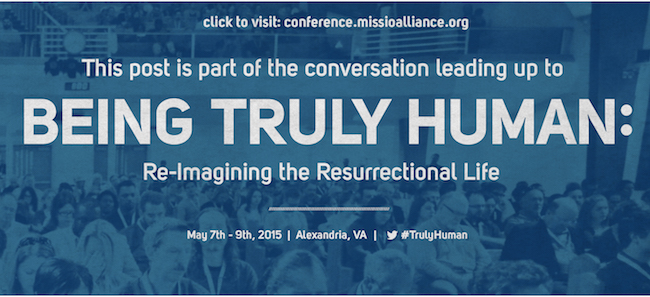Reflecting With Bonhoeffer: Learning to Be #TrulyHuman from the Son of God
Dietrich Bonhoeffer once asked another pastor what he wanted to do with his life – the young Frenchman parson said – “I wish to become a saint.” At first Bonhoeffer was impressed with this answer, but came to question it later. The tendency of Christians seeking enlightenment, holiness, growth – even sainthood – is to withdraw, to become inward, to transcend the world to achieve deeper communion with the God in heaven.
In 1944, Bonhoeffer sat in prison pondering this conversation that happened a decade earlier in his life. The question about what it means to be a Christian continued to preoccupy his thoughts, and common Christian answers (e.g., being more “religious”) came to disturb him more and more. When Christians seek to be “religious,” they are open to the temptation of arrogance, Bonhoeffer comments in his letters to his friend Eberhard Bethge. Or, religiosity leads to despair when one fails, he adds.
As Bonhoeffer put his thoughts on paper, he postulated this:
To be a Christian does not mean to be religious in a particular way, to make something of oneself on the basis of some method or other, but to be a human – not a type of human, but the human that Christ creates in us. It is not the religious act that makes the Christian, but participation in the sufferings of God in the secular life.
Bonhoeffer feared the pervasive assumption amongst most Christians he met that Christianity was essentially self-serving – my problems, my needs, my growth. Christian discipleship is not mainly about turning inward, but turning outward, “allowing oneself to be caught up into the way of Jesus Christ.”
In his July 18th (1944) prison letter to Eberhard, Bonhoeffer mentions that the people who came to Jesus – shepherds, wise men, the centurion, Joseph of Arimathea, the women at the tomb –were not saints, they were not skilled practitioners of religious methods. They simply wanted to be with Jesus and were willing to go wherever he was, in a manger, in the by-ways, the lonely places, and some even to the cross.
“The only thing that is common to all these is their sharing in the suffering of God in Christ.”
Transformation through the gospel does not happen by following God into bliss, by scaling spiritual mountains. The story of Jesus leads us ever deeper into the world and requires of us, in our new humanity, a commitment to “worldliness” – “living unreservedly in life’s duties, problems, successes and failures, experiences and perplexities. In so doing we throw ourselves completely into the arms of God, taking seriously, not our own suffering, but those of God in the world.”
To illustrate this, Bonhoeffer uses the example of Jesus asking his friends to stay awake and watch with him in his hour of anguish at Gethsemane. God expresses his freedom by choosing to suffer in this sin-torn world and he sent Jesus to embody that redemptive suffering. And, in turn, our humanity is renewed by suffering for others when we walk with Christ in the world. In Bonhoeffer’s words: “Humanity is summoned to share in God’s sufferings at the hands of a godless world.” In St. Paul’s word: “When I am weak, then am I strong [through the grace of Christ].”
Bonhoeffer, literally till his last breath, believed that the power of God takes root in us, not despite our humanness, but in and through our humanness precisely because we can choose to suffer with God for good.
It is a grace-filled and humble thing to have to learn our humanity from the Son of God.
—
Read more of Bonhoeffer’s thoughts in Letters and Papers from Prison (New York: Touchstone, 1997). Study his amazing life in the new biography Strange Glory by Dr. Charles Marsh (New York: Knopf, 2014).
[Photo by Wissen911, CC via WikiMedia Commons]




